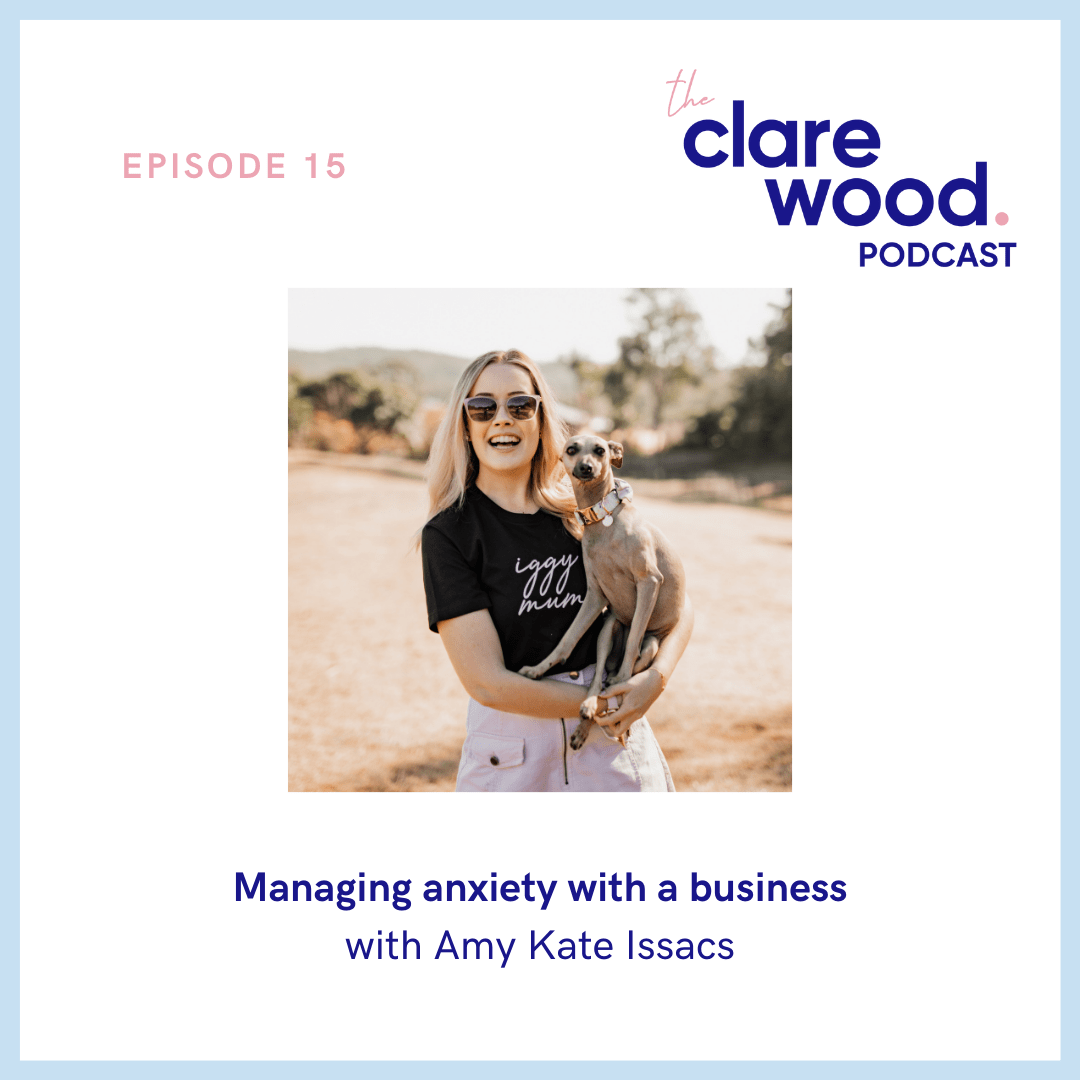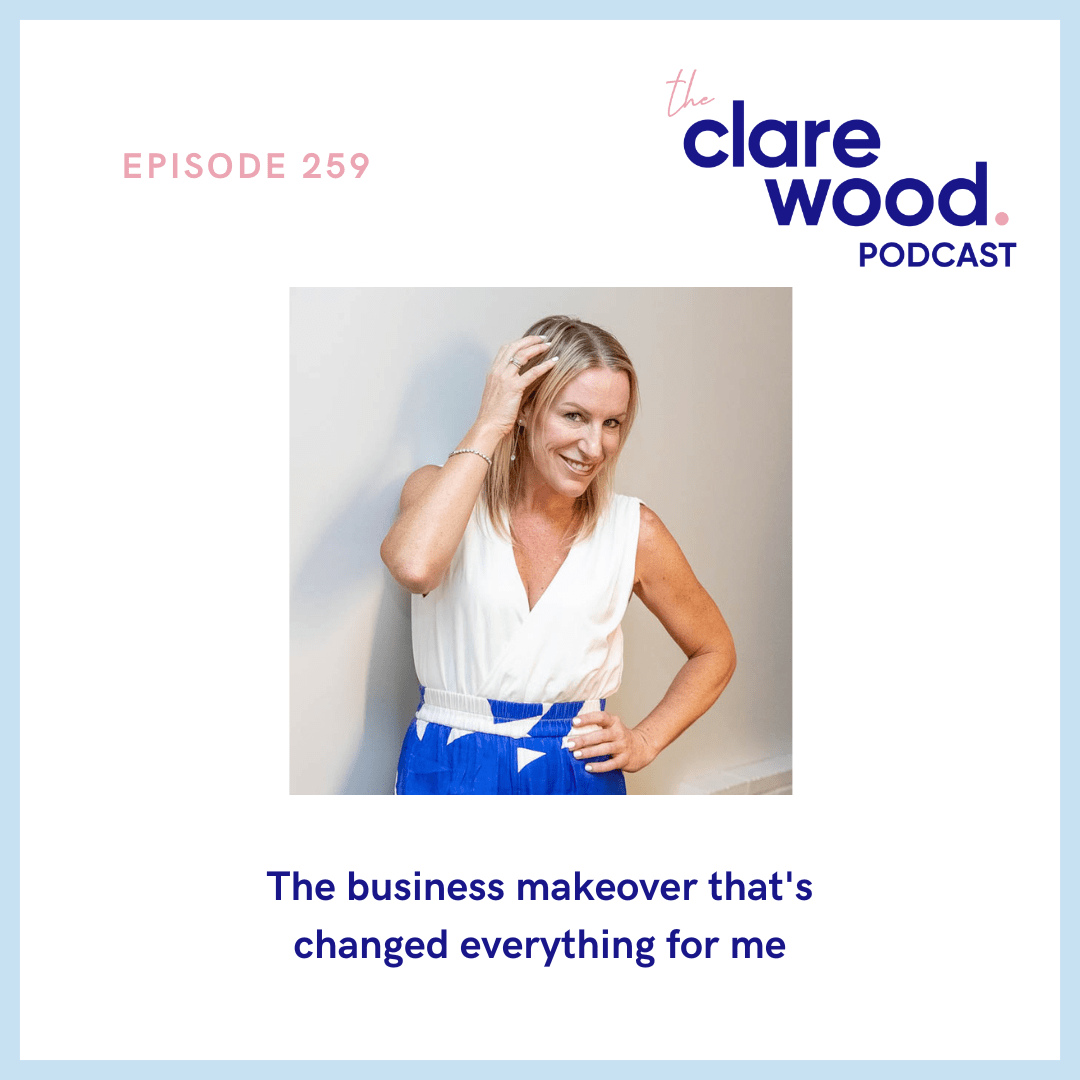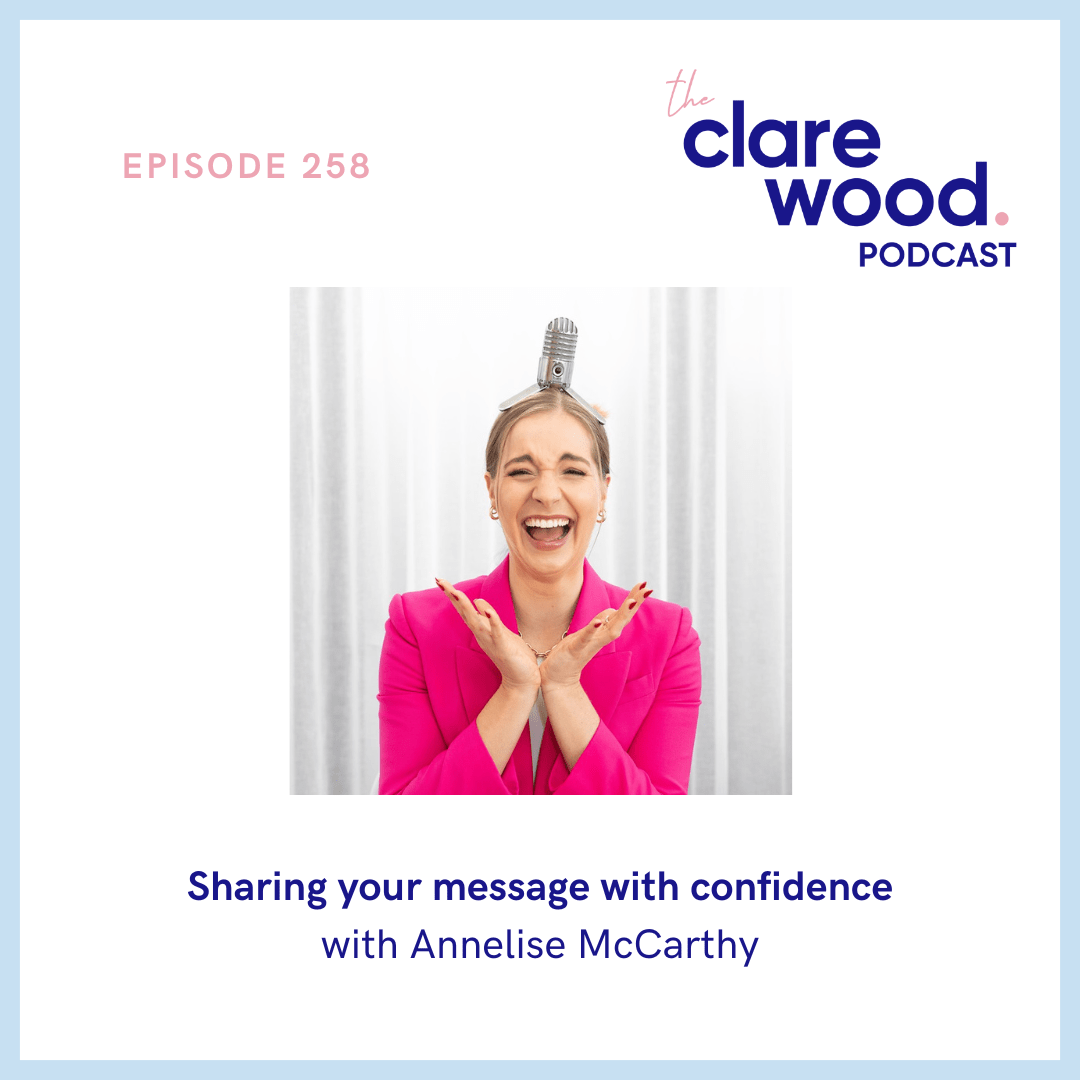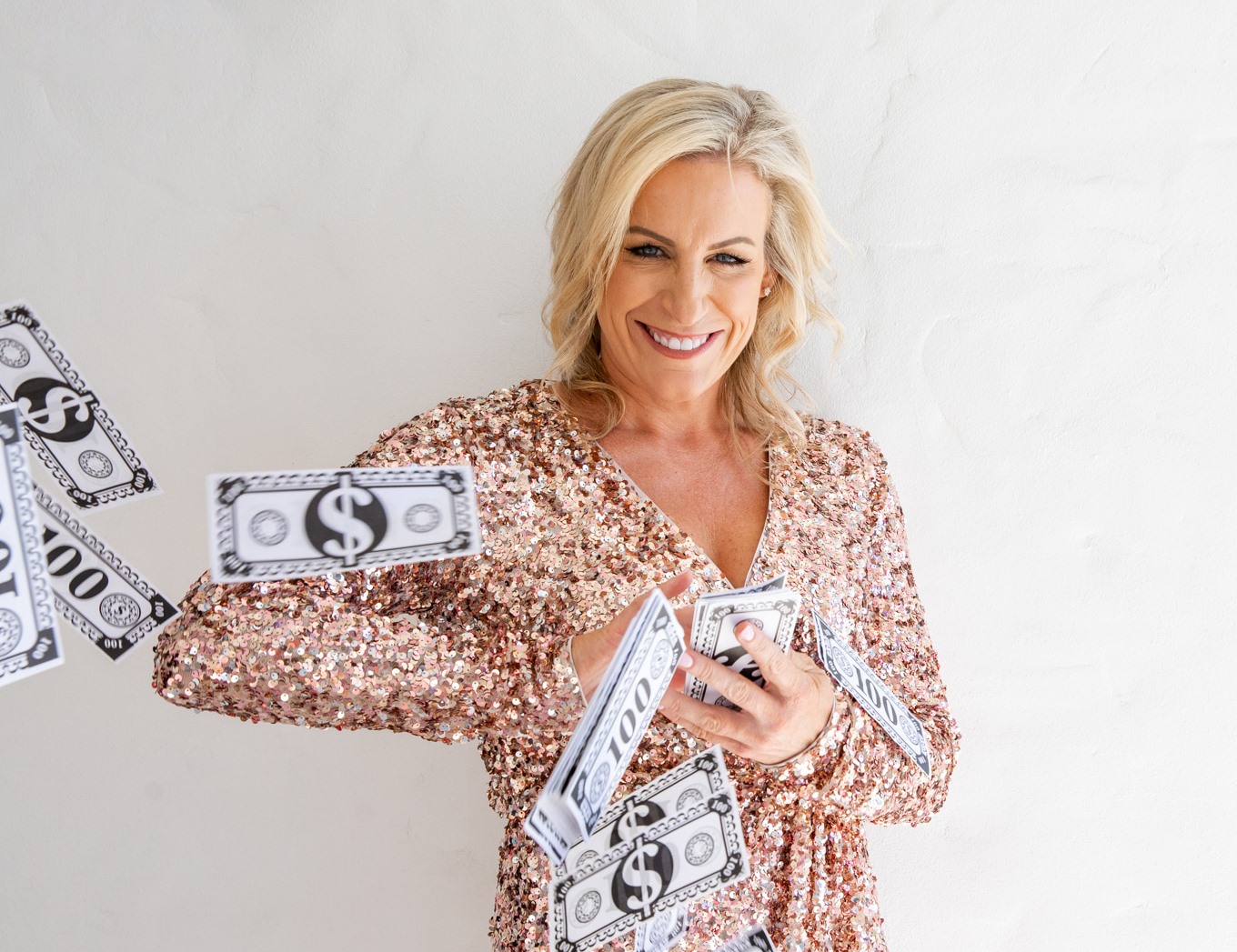Anxiety is on the rise, particularly in the entrepreneurial community.
In this episode, psychologist Amy Kate Isaacs explains techniques for managing anxiety that are tailored to you.
Disclaimer: Content in this episode is not a replacement for treatment. Please see your health professional to discuss your specific circumstances.
In this Episode:
02.00: What actually is anxiety?
05.38: Why is anxiety prevalent in the entrepreneurial/ small business space?
08.19: Amy Kate’s tips for managing anxiety.
14.23: Amy Kate shares how to put a plan in place for dealing with anxiety symptoms.
20.03: Knowing the cost of anxiety to your business.
22.02: Managing anxiety in your business.
Freebies (no opt in required):
MY COPING PLAN PDF >
ACCOMPANYING RECORDING FOR THE COPING PLAN MP3>
Links:
THE MINDFUL COLLECTIVE WEBSITE >
THE MINDFUL COLLECTIVE INSTAGRAM >
CLARE WOOD SERVICES >
CLARE WOOD INSTAGRAM >
Amy Kat’s Bio
As a Psychologist, Amy Kate is strategic and bursting with cutting-edge knowledge, anecdotes, relatable stories and evidence-based tools to inspire mindful and compassionate change to those in The Mindful Collective.
Her bubbly nature and authentic humour leave guests smiling, encouraged and brimming with helpful tips and tricks to thrive and flourish.
Transcript
On today’s episode I chat to Amy Kate who is a psychologist, and she’s here to talk to us about the topic of anxiety, how it impacts business owners, and importantly how you can manage it, to ensure it doesn’t affect your performance as a business owner. There are so many great insights in this episode, so I hope you enjoy.
You’re listening to the Clare Wood podcast, where we talk all things business, finance, marketing, and mindset for entrepreneurs, sharing practical tips, and actionable advice to help you take your business to the next level. Introducing your host: me! I’m Clare Wood, I’m a numbers geek, a travel lover, and a reality tv addict, and I’m here to empower you to create an extraordinary business and an amazing life, because I believe you don’t have to choose between the two. Now let’s dive right in to today’s episode.
Today I wanted to invite in a guest to have a chat to us about the topic of anxiety. And I specifically wanted to get someone who is a qualified psychologist, and a specialist in the space of mental health. So today we have joining us, Amy Kate, welcome!
AMY KATE:
Thanks Clare!
CLARE:
For anyone why doesn’t know you, could you please do a little bit of an intro into who you are and what you do?
AMY KATE:
Absolutely! So I am the owner of The Mindful Collective and our aim is to inspire mindful and compassionate change in those who are part of our collective and where over time, want to inspire 1 million people in Australia to take steps to create space in their minds and inspire compassion in their souls through mindful self-care.
CLARE:
I love that vision. It’s so exciting and inspiring and so good to have you here. Before we get into the nitty gritty of the topic, we might as well start with the basics. So what exactly is anxiety?
What is anxiety?
AMY KATE:
Anxiety is a mental health disorder and it’s characterised by feelings of worry and fear that are strong enough to interfere with our everyday functioning. And of course there is a difference between a clinical anxiety disorder and anxiety symptoms. And some of the symptoms might be, excessive worry, intrusive thoughts, even being really tired.
CLARE:
Ok, that’s really interesting, so there is a distinction between the two, is that right?
AMY KATE:
So it doesn’t become a disorder unless it’s seriously impacting someone’s functioning in multiple areas of their life.
CLARE:
Ok, I’m learning something here, because, I have definitely experienced anxiety symptoms. They were things like, having a hard time sleeping, but actual physical manifestations as well, problems with my vision, and numbness and tingling in my hands and things like that. Which was really scary at the time.
AMY KATE:
Absolutely, all of those are examples I’ve heard of many times before, for symptoms of anxiety.
CLARE:
And then if it becomes something that is a recurrent issue, then it’s defined as an anxiety disorder. Is that right?
AMY KATE:
Yes. So if someone say, was struggling to catch up with friends, or struggling to work and this was a consistent pattern over a period of time, that would be leading us to a diagnosis of anxiety. Of course, there are also many more aspects to it, but for our chat today, that is definitely the most efficient way to describe it.
CLARE:
So the next question… I don’t know if it is just more awareness on mental health recently, but I feel like anxiety in particular is something that is massively on the rise. So is this just something that I’m observing or do you believe anxiety is on the rise, and if so, what do you think the reason is?
AMY KATE:
There is evidence to suggest it is on the rise. Of course we also can see that there are more people talking about anxiety now, as you were saying, so we are raising awareness for it, which is absolutely wonderful. And there are many different identified reason that could be contributing to this. But one is social media. Another is increasing costs of everyday living. Another is that we are no longer running from bears and wolves anymore and our brains are attributing a fear response where we aren’t in a life and death situation, but our brain is really interpreting that situation in that way.
CLARE:
Interesting, ok, so it could be potentially two-pronged. First of all talking about it, but also there is actually a lot more pressure and reasons why anxiety might actually be on the rise as well.
AMY KATE:
Yes, absolutely!
CLARE:
Again a reason why I wanted to get you on the podcast was I personally believe that anxiety is really prevalent in the entrepreneurial community, so I would love to know, in your professional opinion, is that just my opinion or do you believe that is actually the case, and if there is a high occurrence of it in the small business space, what do you think the reason might be?
Why is anxiety prevalent in the entrepreneurial/ small business space?
AMY KATE:
I guess if we think about the type of people who are drawn to running their own businesses, they are often wanting to make a change in the world, they are very passionate about that, they are wanting to have freedom and flexibility, so if that is something we are working towards, of course there are sacrifices and struggles we have to go through as part of that journey. Considering that there are a lot of road blocks that come up in the life of a small business owner, it’s probably not surprising that we do see a higher prevalence of anxiety in those who own their own businesses.
CLARE:
And that all makes so much sense. Thanks for your interpretation of that.
What I’d love to do now, is extending a little bit more about what you said about anxiety symptoms and anxiety disorder, do you believe that someone has anxiety or do you think that it’s something that someone can experience but that they can recover from?
AMY KATE:
I love that question so, my answer again is two-pronged. There are some people who have really strong symptoms and that’s something they continue to experience and that’s a disorder level throughout their life. It will still come in waves. So there will be times when they experience less anxiety and times when they will experience more anxiety and for other people, we can go through periods of anxiety ourselves, without meeting a clinical level to achieve a diagnosis essentially. So we can say, if we are purchasing a property for our business or we are meeting with a lot of different contractors that can increase our anxiety and then what we would expect to see is a decrease in the anxiety in the hours, days or weeks later, depending on the event. If we didn’t see that, that’s when we would want that person to check in with a mental health professional or GP.
CLARE:
Ok great. So what would be your best advice for managing anxiety for anyone listing and who can relate to the various symptoms we have spoken about?
Tips for managing anxiety
AMY KATE:
Number one would absolutely be get to know your anxiety symptoms. Get to know them, swim in them, spend some time with them, have a beverage with them, just spend time getting to know them very very well, because that can help you manage those symptoms and experiences. And the categories I guess are particularly helpful to understand are triggers. Now the triggers can be thoughts, they can be actual people, actual situations or events, they can even be emotions themselves. So guilt etc can trigger anxiety. Knowing about unhelpful thinking styles and understanding the ones you fall more into. And one I here so often with entrepreneurs is should-ing and must-ing. They should all over themselves, they are telling themselves what they should be doing, should’ve done this, should’ve done that and they place unrealistic pressure and demands on themselves and when we identify as an unhelpful thinking style, that can really help people manage that and diffuse from that better. Because we can see that that is not getting them where they need to go. Another is that feelings that come up around anxiety whether it’s guilt, shame, feeling loss of control, feeling isolated, and again, because that can help us manage that, and move forward. Physical sensations like the ones you mentioned before are also really helpful to understand. Sometimes we almost become too aware of the symptoms, like our heart rate is increasing, but that might be because we are excited, rather than anxious, so we still need to keep ourselves in check even if we know what to look for in our own bodies. And actually, twice I’ve had people give examples of left earlobe tingling. So specific! And they got to know that over time by really reflecting on what am I feeling at this time, and often we want to run away from it, we don’t want to think about what we are thinking or feeling or even feeling within our body, but actually getting to know it, can help us feel more comfortable with that beast. To get to know anxiety, we know ok, this is part of the journey of being a business owner. It’s part of the journey of being human. And of course, one that often gets skipped but is very very helpful to understand is unhelpful coping strategies we use, so what does your autopilot tell you when you start feeling anxious, does it tell you to withdraw, does it tell you to be sarcastic, does it tell you to be overly assertive, does it tell you to go and speak to someone that maybe isn’t the most helpful person to speak to. Sometimes our unhelpful coping strategies are wine of gambling or all sorts of other things and we need to tread that line very carefully between is it helpful or unhelpful. Is it a glass of wine with dinner helping us relax or can we see that we are using something to help us cope or get control of a situation, even like being passive aggressive.
CLARE:
This is so good. Generally when you hear people talk about how do you suggest I manage anxiety, you hear terms thrown our like exercise and meditation, and I noticed just then you didn’t actually mention either of those.
AMY KATE:
No, mainly because although exercise is fantastic for mental health, there are people where if they don’t understand these symptoms and then they go out for a run for the first time in a while, they are going to experience all the symptoms that stress them out. Their heart rate is going to increase, they are going to get sweaty, their breathing will increase, and if we don’t recognise that that is because I am exercising and not because I am anxious, and if we don’t have that calm self-talk happening at the time, we can actually come back feeling more anxious and it’s the same for mindful meditation. Obviously, given my business name, I am a big advocate of mindfulness but mindfulness can look like many different things and really, I am a big advocate of being mindful of our own mental health and our own wellbeing, but if we are doing a mindful meditation and one of our triggers is when we notice our breathing in a certain way, that could actually trigger more anxiety, rather than help us overcome our anxiety and move forward with the goals we have for that day. So it’s really about knowing ourselves first and knowing our symptoms and knowing the way we personally experience anxiety. No one can tell you that for you, you have to really think about it yourself, and then once you know them, it is so helpful because then you can do meditation or exercise or have a glass of wine, because you know what you are doing is helpful for you in that moment, because you are aware of the symptoms you experience and how those coping strategies help you rather than hinder you.
CLARE:
That is so interesting! Before we got started recording, you mentioned you are happy to share with our listeners today a tool that can help them be aware of their symptoms and how to put a plan in place. Did you want to expand a bit more about that?
How to put a plan in place for dealing with anxiety symptoms
AMY KATE:
Absolutely, so I created over time a coping plan and that includes the first page being around all the things we need to watch out for, kind of the clues that we might be starting to experience anxiety, because we want to catch it before it escalates too quickly. We want to know what do I look like, what do my thoughts look like at a 4/10, rather than only noticing them when they are an 8/10 and we might need more intense strategies to help us then. So in the coping plan there is actually room for you to write in your triggers, the things that you are aware of that make you more susceptible to feeling anxious. Your thoughts and potentially some unhelpful thinking styles, you identify with. Your feelings and physical sensations and also those cheeky unhelpful coping strategies, which is often why someone ends up in my clinic room. So they might notice that they are really procrastinating, their heart is in the right place, their head is in the right place in their business but they just keep procrastinating and so that’s another one that often ends up in the unhelpful coping strategies section. And on the flip side, because it’s nice to have some strategies to help us and experiment with, of course we need to find out what works for each individual person, but some grounding strategies, some thought-diffusion ideas to help us un-hook from our thoughts. So we don’t necessarily want to change our thoughts, or push them down, because that tells our brain that they are important, but that we are going to bring them up later, and that’s often what our brains will do. I often hear people say when they have gone on holidays from their business and suddenly they have this self-doubt wash over them, when they are on the plane or way out, and that can be what has happened, they push these thoughts down, so now their brain bringing them back up for awareness when they are felling more relaxed.
CLARE:
That is so interesting, and I have to say that that’s what happened to me on my recent holiday to Fiji. When I first got there, I was wondering why I was feeling stressed and anxious because I was on holidays but it was really interesting. Good analogy.
For anyone who wants to get their hands on the coping plan that Amy Kate mentioned, it will be in today’s show notes. So that is at clarewood.com.au/podcast/episode15.
Now Amy Kate, what advice would you give to anyone who either has been diagnosed with anxiety or maybe they are listening and some of the symptoms we have spoken about and behaviours we have mentioned, have resonated with them, and they are thinking maybe this might be something that might be an issue for me, what advice would you give to them?
AMY KATE:
Absolutely get some support. Now that can look different for every person. Some people resonate with really speaking to their GP and some are really skilled in this area. Other people prefer to talk to a psychologist like myself, or a psychiatrist and they will go through process’s, like this, as part of that, but of course we need to find the right person for that individual. I know for me, when I was looking for a psychologist when I was 17, I went through 4 psychologists before finding the right person for me and I think this is the same from psychologists, acupuncturists, nutritionists, so many areas…
CLARE:
…to business coaches!
AMY KATE:
Exactly! It’s about figuring out what we want out of that relationship because it is a one-way relationship, it’s a service based relationship, so what do you want from that person? So you may want to feel that they are really professional, really business-focused, business-like person, they are wearing a suit and very clinical or is it that you are wanting someone more relaxed and has more chilled-out vibe, and that will play out they way therapy works, regardless of the type of therapy, even if it is puppy therapy! Whatever you are into, that’s honestly one of the most important, key notes to keep in mind, is that finding the right support is not just about seeing a psychologist and ticking that off the list, it’s about finding someone you resonate with, and that is incredibly important, because that’s how it works, gelling of the relationship and getting that spark with that person and feel comfortable enough to learn new skills and be vulnerable.
Knowing the cost of anxiety to your business
Also, as a bit of a side note, knowing the cost of anxiety in your business is very helpful, because suddenly we can be more motivated to invest in this area. Anxiety can help us increase our sales, we know that small amounts of anxiety or what we call EU stress, really boosts us up, so we have the motivation and the adrenaline at times, to keep going. When it becomes dis-stress obviously not so good, and we can see plenty of research in this area, particularly around the entrepreneur stress cycle around the decrease in sales and performance when people are experiencing sub-clinical levels of anxiety.
CLARE:
So interesting! And one of the biggest takeaways from what Amy Kate is talking about is – don’t give up. Even if you’ve tried speaking to 10 different psychologists and it didn’t work, then you just haven’t found the right one.
This is a habit of mine, and you’ll have to forgive me Amy Kate, but I love to relate things in life back to dating, because I spent a lot of my time single – don’t give up too easily, sometimes you have to kiss a lot of frogs to find your prince and it’s the same with finding someone who is going to be able to help you, on your journey. But the thing that I’ve loved that you honed in on is no matter what you are going through, there is hope and light at the end of the tunnel, and anxiety can be managed.
Managing anxiety in your business
AMY KATE:
It can be managed, there are many high performing people, many kind people and compassionate people, people who are achieving their specific goals with their values in mind, that have anxiety and that’s why when we get to know it and build coping strategies that work for us, and experimenting with them. One that I hear often is about deep breathing, and people come to me and say if you tell me to deep breath, I may throw this water at you. They make it very clear that they do not want me to sit there in a first or second session and say, have you heard of deep breathing? There are not many people these days who haven’t heard of deep breathing as a strategy BUT if we are doing deep breathing ourselves, and our beautiful diaphragm muscle is doing it’s thing and communicating to our fear system that we are calm and safe, but we are thinking we are about to lose most of our income or not make the sale we want to, or it’s going to be really bad, our body will always take the fear over the relax. It’s preparing just in case, our brain doesn’t want us to get tripped up, it is a fear detection system so it will always go with that, so when we start working with a psychologist or another health professional, or even in some cases a really insightful thoughtful friend, they can start to help us see, maybe sometimes I’m not actually using these strategies in a way that is effective and we can tweak them to make them better. Which is, I know, what you do a lot with businesses Clare.
CLARE:
Definitely!
So, if someone is wanting to look at the mechanisms you have mentioned, if they want a copy of the coping plan you spoke about earlier and if there are any other resources perhaps you’d like to share then please Amy Kate, send them across, because the more tools we can give people to help people cope with anxiety, then we’ll be happy to share them to help give them a hand.
AMY KATE:
Absolutely!
CLARE:
Thanks so much for joining us today, I have learned a lot and I’m sure the listeners have loved it as well, if anyone does want to learn more about you or connect with you, how can they do so?
AMY KATE:
Social media is probably one of the easiest ways to do that, which is unusual for a psychologist, but I love being on social media, and it is a way we connect with people but of course you can always email me at hello@themindfulcollective.co. I would be more than happy, actually thrilled, to chat about some of the things they are noticing in themselves, and help with any questions that come up with the coping plan, because this is something I do in therapy whether it is with people who own businesses or not. And it can seem a bit daunting, usually it takes about 4 sessions to go through it in detail, so if you do have any questions of course reach out, we’d love to help!
CLARE:
Amazing, thank you again for joining us, and make sure you check out the show notes at clarewood.com.au/podcast/episode 15
Thank you so much for joining me today, if you enjoyed this episode, please make sure you subscribe to receive future episodes, and I’d be so grateful for a review on apple podcast! If you’d like a copy of the show notes or any of the links mentioned today, please jump over to clarewood.com.au/podcast and remember that Clare is spelled CLARE, have a wonderful week and look forward to chatting to you again soon!







